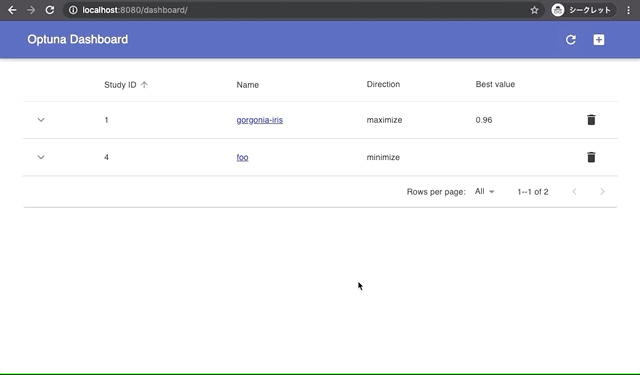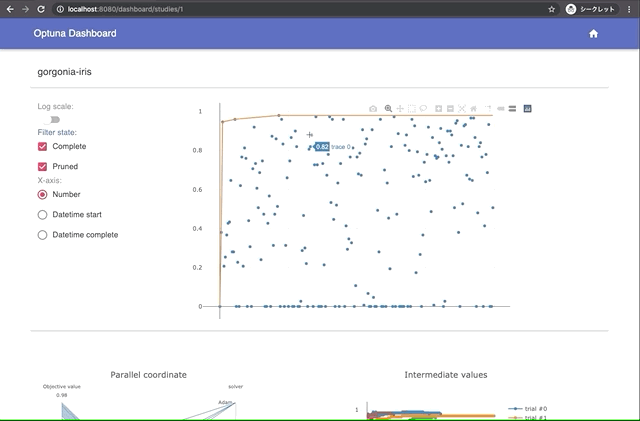1<div align="center"><img src="https://raw.githubusercontent.com/optuna/optuna/master/docs/image/optuna-logo.png" width="800"/></div> 2 3# Optuna: A hyperparameter optimization framework 4 5[](https://www.python.org) 6[](https://pypi.python.org/pypi/optuna) 7[](https://anaconda.org/conda-forge/optuna) 8[](https://github.com/optuna/optuna) 9[](https://circleci.com/gh/optuna/optuna) 10[](https://optuna.readthedocs.io/en/stable/) 11[](https://codecov.io/gh/optuna/optuna/branch/master) 12[](https://gitter.im/optuna/optuna) 13 14[**Website**](https://optuna.org/) 15| [**Docs**](https://optuna.readthedocs.io/en/stable/) 16| [**Install Guide**](https://optuna.readthedocs.io/en/stable/installation.html) 17| [**Tutorial**](https://optuna.readthedocs.io/en/stable/tutorial/index.html) 18 19*Optuna* is an automatic hyperparameter optimization software framework, particularly designed 20for machine learning. It features an imperative, *define-by-run* style user API. Thanks to our 21*define-by-run* API, the code written with Optuna enjoys high modularity, and the user of 22Optuna can dynamically construct the search spaces for the hyperparameters. 23 24## News 25 26Help us create the next version of Optuna! 27Please take a few minutes to fill in this survey, and let us know how you use Optuna now and what improvements you'd like.�� 28 29All questions optional. ��♂️ 30https://forms.gle/mCAttqxVg5oUifKV8 31 32## Key Features 33 34Optuna has modern functionalities as follows: 35 36- [Lightweight, versatile, and platform agnostic architecture](https://optuna.readthedocs.io/en/stable/tutorial/10_key_features/001_first.html) 37 - Handle a wide variety of tasks with a simple installation that has few requirements. 38- [Pythonic search spaces](https://optuna.readthedocs.io/en/stable/tutorial/10_key_features/002_configurations.html) 39 - Define search spaces using familiar Python syntax including conditionals and loops. 40- [Efficient optimization algorithms](https://optuna.readthedocs.io/en/stable/tutorial/10_key_features/003_efficient_optimization_algorithms.html) 41 - Adopt state-of-the-art algorithms for sampling hyperparameters and efficiently pruning unpromising trials. 42- [Easy parallelization](https://optuna.readthedocs.io/en/stable/tutorial/10_key_features/004_distributed.html) 43 - Scale studies to tens or hundreds or workers with little or no changes to the code. 44- [Quick visualization](https://optuna.readthedocs.io/en/stable/tutorial/10_key_features/005_visualization.html) 45 - Inspect optimization histories from a variety of plotting functions. 46 47 48## Basic Concepts 49 50We use the terms *study* and *trial* as follows: 51 52- Study: optimization based on an objective function 53- Trial: a single execution of the objective function 54 55Please refer to sample code below. The goal of a *study* is to find out the optimal set of 56hyperparameter values (e.g., `classifier` and `svm_c`) through multiple *trials* (e.g., 57`n_trials=100`). Optuna is a framework designed for the automation and the acceleration of the 58optimization *studies*. 59 60[](http://colab.research.google.com/github/optuna/optuna-examples/blob/main/quickstart.ipynb) 61 62```python 63import ... 64 65# Define an objective function to be minimized. 66def objective(trial): 67 68 # Invoke suggest methods of a Trial object to generate hyperparameters. 69 regressor_name = trial.suggest_categorical('classifier', ['SVR', 'RandomForest']) 70 if regressor_name == 'SVR': 71 svr_c = trial.suggest_float('svr_c', 1e-10, 1e10, log=True) 72 regressor_obj = sklearn.svm.SVR(C=svr_c) 73 else: 74 rf_max_depth = trial.suggest_int('rf_max_depth', 2, 32) 75 regressor_obj = sklearn.ensemble.RandomForestRegressor(max_depth=rf_max_depth) 76 77 X, y = sklearn.datasets.load_boston(return_X_y=True) 78 X_train, X_val, y_train, y_val = sklearn.model_selection.train_test_split(X, y, random_state=0) 79 80 regressor_obj.fit(X_train, y_train) 81 y_pred = regressor_obj.predict(X_val) 82 83 error = sklearn.metrics.mean_squared_error(y_val, y_pred) 84 85 return error # An objective value linked with the Trial object. 86 87study = optuna.create_study() # Create a new study. 88study.optimize(objective, n_trials=100) # Invoke optimization of the objective function. 89``` 90 91## Examples 92 93Examples can be found in [optuna/optuna-examples](https://github.com/optuna/optuna-examples). 94 95## Integrations 96 97[Integrations modules](https://optuna.readthedocs.io/en/stable/tutorial/10_key_features/003_efficient_optimization_algorithms.html#integration-modules-for-pruning), which allow pruning, or early stopping, of unpromising trials are available for the following libraries: 98 99* [AllenNLP](https://github.com/optuna/optuna-examples/tree/main/allennlp) 100* [Catalyst](https://github.com/optuna/optuna-examples/tree/main/pytorch/catalyst_simple.py) 101* [Catboost](https://github.com/optuna/optuna-examples/tree/main/catboost/catboost_simple.py) 102* [Chainer](https://github.com/optuna/optuna-examples/tree/main/chainer/chainer_integration.py) 103* FastAI ([V1](https://github.com/optuna/optuna-examples/tree/main/fastai/fastaiv1_simple.py), [V2](https://github.com/optuna/optuna-examples/tree/main/fastai/fastaiv2_simple.py)) 104* [Keras](https://github.com/optuna/optuna-examples/tree/main/keras/keras_integration.py) 105* [LightGBM](https://github.com/optuna/optuna-examples/tree/main/lightgbm/lightgbm_integration.py) 106* [MXNet](https://github.com/optuna/optuna-examples/tree/main/mxnet/mxnet_integration.py) 107* [PyTorch](https://github.com/optuna/optuna-examples/tree/main/pytorch/pytorch_simple.py) 108* [PyTorch Ignite](https://github.com/optuna/optuna-examples/tree/main/pytorch/pytorch_ignite_simple.py) 109* [PyTorch Lightning](https://github.com/optuna/optuna-examples/tree/main/pytorch/pytorch_lightning_simple.py) 110* [TensorFlow](https://github.com/optuna/optuna-examples/tree/main/tensorflow/tensorflow_estimator_integration.py) 111* [tf.keras](https://github.com/optuna/optuna-examples/tree/main/tfkeras/tfkeras_integration.py) 112* [XGBoost](https://github.com/optuna/optuna-examples/tree/main/xgboost/xgboost_integration.py) 113 114 115## Web Dashboard (experimental) 116 117The new Web dashboard is under the development at [optuna-dashboard](https://github.com/optuna/optuna-dashboard). 118It is still experimental, but much better in many regards. 119Feature requests and bug reports welcome! 120 121| Manage studies | Visualize with interactive graphs | 122| -------------- | --------------------------------- | 123|  |  | 124 125Install `optuna-dashboard` via pip: 126 127``` 128$ pip install optuna-dashboard 129$ optuna-dashboard sqlite:///db.sqlite3 130... 131Listening on http://localhost:8080/ 132Hit Ctrl-C to quit. 133``` 134 135## Installation 136 137Optuna is available at [the Python Package Index](https://pypi.org/project/optuna/) and on [Anaconda Cloud](https://anaconda.org/conda-forge/optuna). 138 139```bash 140# PyPI 141$ pip install optuna 142``` 143 144```bash 145# Anaconda Cloud 146$ conda install -c conda-forge optuna 147``` 148 149Optuna supports Python 3.6 or newer. 150 151Also, we also provide Optuna docker images on [DockerHub](https://hub.docker.com/r/optuna/optuna). 152 153## Communication 154 155- [GitHub Issues] for bug reports, feature requests and questions. 156- [Gitter] for interactive chat with developers. 157- [Stack Overflow] for questions. 158 159[GitHub issues]: https://github.com/optuna/optuna/issues 160[Gitter]: https://gitter.im/optuna/optuna 161[Stack Overflow]: https://stackoverflow.com/questions/tagged/optuna 162 163 164## Contribution 165 166Any contributions to Optuna are more than welcome! 167 168If you are new to Optuna, please check the [good first issues](https://github.com/optuna/optuna/labels/good%20first%20issue). They are relatively simple, well-defined and are often good starting points for you to get familiar with the contribution workflow and other developers. 169 170If you already have contributed to Optuna, we recommend the other [contribution-welcome issues](https://github.com/optuna/optuna/labels/contribution-welcome). 171 172For general guidelines how to contribute to the project, take a look at [CONTRIBUTING.md](./CONTRIBUTING.md). 173 174 175## Reference 176 177Takuya Akiba, Shotaro Sano, Toshihiko Yanase, Takeru Ohta, and Masanori Koyama. 2019. 178Optuna: A Next-generation Hyperparameter Optimization Framework. In KDD ([arXiv](https://arxiv.org/abs/1907.10902)). 179